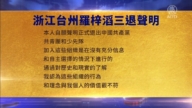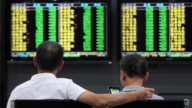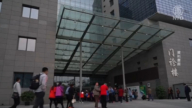【新唐人2014年10月20日讯】随着中国经济不断下滑,中国股市也持续低迷。过去7年间,中国大盘持续下滑,中国股民已经亏损超过17万亿人民币。而在上市公司的高管中,继数千名高管陆续辞职后,日前又爆出在职高管减持股票,套现数百亿元的惊人举动。专家指出,中国股市的这种现象,反映了中国经济的死结,以及中国上市公司不可告人的黑洞。
陆媒《四川在线》报导,10月16号,上证指数相对7年前同一天跌去了61%。07年的10月16号,上证综指攀上6124点的历史高峰。进入2008年,上证指数节节败退,短短1年后的1月28号,最低跌到1664点,累计跌幅超过72%。往后一直在2000点附近徘徊。
数据显示,07年10月16号,中国股市共有1471只股票,总市值超过35万亿元﹔而今年的同一天,在A股市场上市交易的个股已经达到2558只,总市值却只有29万亿元,当年的1471只股票的市值只剩18.52万亿元,7年时间,这些股票蒸发掉17万多亿元人民币,这其中还没有扣除通货膨胀因素。
而在国际市场,不论是香港、欧洲、还是美国股市,早已恢复到金融海啸以前的水平。美股2009年3月起连续上涨,去年连续创下新高,截至今年9月底累计涨幅超过160%。而中国上证指数却还是在2000点徘徊。
中国金融智库研究员巩胜利:“2000点可能就是中国股市的祭点,就是历史没有办法绕过的这个点,除了经济、市场的环境外,政治的党的环境,这是难以绕过的死结。”
而《21世纪经济报导》统计数据显示,今年1月到9月份,上市公司高管在不断减少对自家公司股票的持有量,其中,9月份创下年内新高,高管减少持股超过162亿元。到10月中旬,被上市公司高管减少持股的公司共有769家,净增减持金额超过474亿元。
巩胜利:“上市半个月或一个月之内都是套现走人,这是中国股市的一种潮流,这种情况往往是股市有水分,或者有黑洞,造成的一种结果,还有一种情况,是因为中国股市十几年来一直不景气,所以套现成了上市公司最基本的上市所要达到的目标。”
江浙某券商首席策略分析师,接受《21世纪经济报导》记者采访时表示,7月大盘指数反弹以来,一波小市值股票的涨幅比较明显,疯狂的上涨之后高管在9月份的套现可以理解。
美国南卡罗莱纳大学艾肯商学院教授谢田:“他如果要减持的话,他会放一些利好的消息,让他的股票有所上升,这样他们抛售的时候才会多赚一点,实际上这些中国股民老百姓都被套进去了,减持突然增加,是从高管这个群体对中国经济前景投了一个不信任票。”
另外,根据金融数据和分析工具服务商Wind的数据统计,截至9月15号,9个月中,大约出现了2000份上市公司的高管辞职公告,而离职的高管数量更是远远超过了公告份数。
其中,有110家公司的112位董事长先后离职,也就是说,平均不到3天时间就有1位上市公司董事长辞职。有些上市公司出现9个月内两任董事长先后辞职现象。
谢田:“可能跟中共的反腐有关,国企高管,上市公司高管腐败案例非常多,在这种重新归队,重新找靠山的时候,这种大规模的辞职可以理解。”
巩胜利:“股市是中国来钱最快的行业了,高管套现走人,说明中国股市前景依然不好,而中国股市不好来源于中国经济GDP的增长,9月份中国出了通缩的苗头,这是一个严重的信号。”
通缩是通货紧缩的简称,属于一种金融危机。通货紧缩,会造成企业利润减少﹔个人预期收入降低﹔宏观经济悲观衰退﹔金融秩序混乱等现象,对全球经济造成的损害远远大于通货膨胀。
采访编辑/刘惠 后制/肖颜
Chinese Stock Market Sees Black Holes
Along with economic decline, the Chinese stock market
has also gone downhill.
Over the past seven years, Chinese investors have lost
an equivalent of 2.8-trillion US dollars (17-trillion yuan).
Following the resignation of several thousand executives
from listed companies, many of the serving executives
are said to be reducing their stock holdings, and cashing out
hundreds-of-billions of RMB.
Experts say the state reflects a deadlock in China’s economy
and a sinister black hole in the country’s listed companies.
The Chinese scol.com reported that the Shanghai Composite
Index (SCI) slid by 61% compared to seven years ago.
Oct.16, 2007—The SCI was on a historic peak of 6124 points,
but started to decline in 2008, and dropped to 1664 on Jan. 28,
2009, with a cumulative drop of more than 72%
and has since remained hovering at around 2000 points.
Data shows a total of 1,471 shares, with the total market
capitol reaching over 5.7–trillion dollars (35-trillion yuan)
in the Chinese stock market on Oct. 16, 2007.
However, 7 years later in 2014, the total worth was just over
three-trillion dollars (18.5-trillion yuan); nearly three-trillion
(17 trillion yuan) had evaporated over the 7 year period
(inflation not adjusted in calculation).
In international markets such as Hong Kong, Europe or U.S.,
stock markets have recovered from the financial tidal wave.
The U.S. stocks have gone up since March 2009, hitting new
highs last year; with a rise of over 160% by this September.
Chinese financial think-tank and researcher, Gong Shengli:
“China’s 2000 points is probably the point of offering for
China’s stock market; it can’t pass this level; it’s a deadlock
for the economy, stock market, politics and the Party."
Data from the 21st Century Business Herald showed China’s
listed companies suffering from their executives reducing
their stock holdings of their own companies
between January and September this year.
In September, the drop hit a record high of 2.6-billion dollars
(16.2-billion yuan), and by mid-October, a total of 769 listed
companies found its executives dropping their stock holdings
with a net monetary drop of 7.7-billion dollars (47-bn yuan).
Gong Shengli: “This is a trend in China’s stock market,
where the listing companies would cash out and leave
between two weeks and a month; it happens frequently
with the problematic or ‘black hole’ stocks."
“And because China’s stock markets have stayed sluggish
for more than a decade, companies see the cashing out
as their goal to becoming listed."
An anonymous chief strategist of a stock broker told
the 21st Century Business Herald that since the market index
rebounded in July, a wave of small-cap stocks rose obviously,
causing executives to understandably cash out in September.
Prof. XieTian, Aiken School of Business, Univ. of S.Carolina:
“To reduce the holding, they release some good news to raise
the stock value; then they can earn more when cashing out."
“In fact, other Chinese investors would become the victims;
a sudden increase in the reduction of personal holdings shows
a lack of trust in the economy by those investing executives."
According to Wind Financial Terminal, as of Sept. 15,
there have been about 2,000 resignations by top executives
from listed companies over the last nine months; yet the true
total of resignations is much higher than what is announced.
Among them are 112 chairmen from 110 companies, meaning
an average of one chairman leaving in less than every 3 days.
Some listed companies suffered from two chairmen
resigning within nine months.
Professor Xie Tian: “It could be related to the CCP’s anti-graft
campaign, as there are so many corrupt cases involving
the executives of listed companies."
“This kind of mass resignations and to look for new patrons
is understandable."
Gong Shengli: “The stock market is fast-money in China;
the executives cashing out and leaving indicates that
the outlook of the stock market is still bad."
“The bad stock comes from the GDP growth; China showed
signs of deflation in September and this is a serious signal."
Deflation is a financial crisis as it will cause corporate profits
to drop, lower expected individual income, cause pessimistic
macroeconomic recession and financial disorder, etc.;
the global economic damage is far greater than just inflation.
Interview & Edit/LiuHui Post-Production/XiaoYan


























